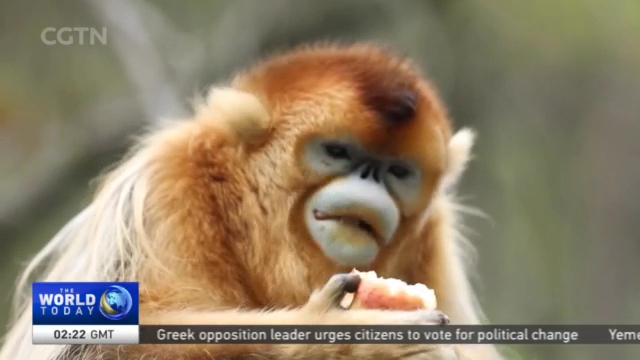
11:32, 23-May-2019
Shennongjia National Park: Golden monkey keepers urge more animal protection measures
Updated
11:30, 26-May-2019
03:04

This year marks the 70th anniversary of the founding of the People's Republic of China. The passing decades have seen growth of the economy, as well as increasing protection of nature. CGTN reporters have conducted a series of investigations in Shennongjia National Park. Today we focus on diversity of its animal species. The mountains in Hubei province provide ideal living conditions for golden monkeys. But in the early 1980s, deforestation, and other human activities put the species in danger. As people started to realize the need to act, the golden monkeys' habitat has recovered. CGTN's Zhao Yunfei reports.
It's a unique language just between Yang Jingyuan and his monkeys. The animal raiser is calling the golden monkeys miles away to come down the mountain. This creature, with a light blue face and thick lips, is known as the snub-nosed monkey, a first class protected animal raised in central China.
They like eating apples.
But now they are totally spoiled.
YANG JINGYUAN HEAD OF SCIENTIFIC ACADEMY, SHENNONGJIA NATIONAL PARK "During the winter time, the monkeys can hardly find anything to eat when they are out there in the mountains. We feed them peanuts. That's why they all love eating peanuts."
Over the past three decades, the number of golden monkeys in the Shennongjia area has increased from 5 hundred to 13 hundred.
ZHAO YUNFEI SHENNONGJIA NATIONAL PARK "Patrolling the mountains is an everyday routine. Researchers are observing the golden monkey's living behavior. By studying the animal's habits, scientists can help increase the breeding of the endangered species."
HUANG TIANPENG STAFF, GOLDEN MONKEY STUDY CENTER "Usually, wild monkeys choose to stay away from people. But our frequent interaction with the monkeys here has enabled us to stay close to them, so that we can know them better."
If the crew finds the monkeys in need, they take them to the safe heaven, a rescue station nearby.
The golden monkeys were first found in the Shennongjia in the late 1970s. The discovery of the species stopped the rampant deforestation in the area. Since then, protection measures were taken.
YANG JINGYUAN HEAD OF SCIENTIFIC ACADEMY, SHENNONGJIA NATIONAL PARK "Through the protective projects, human activities are removed from the areas where monkeys live. Gradually, the living conditions of the monkeys have improved and the total number of the species has increased."
But more has to be done. Yang Jingyuan says, so far all the protective policies are ruled by multiple administrative divisions. To provide a better environment, more cross-district cooperation is needed. Zhao Yunfei, CGTN, at the Shennongjia National Park, China.

SITEMAP
Copyright © 2018 CGTN. Beijing ICP prepared NO.16065310-3
Copyright © 2018 CGTN. Beijing ICP prepared NO.16065310-3